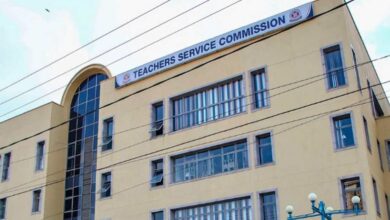
TSC- KESSHA Proposes New Job Groups D6 and D7
The Kenya Secondary School Heads Association (KESSHA) is calling on the Teachers Service Commission (TSC) to revise the current grading structure for school heads by introducing two new job groups — D6 and D7 — to better align with principals’ increasing responsibilities and qualifications.
The appeal was made during the closing ceremony of the 46th KESSHA Annual Conference held in Mombasa, which brought together over 9,000 school heads from across Kenya. KESSHA Chairperson Willie Kuria led the push, stating that the current highest grade for secondary school principals — Job Group D5 — does not reflect the true administrative burden or academic qualifications of many school leaders.
“TSC should expand the job group ceiling from D5 to D7 and promote acting principals who have served in the role for more than six months,” said Kuria.
Rationale Behind the Proposed Job Groups D6 and D7
Kuria argued that many principals are shouldering enormous workloads under the Competency-Based Curriculum (CBC), with added pressure from ongoing infrastructure challenges, student population growth, and leadership expectations. However, the current pay and grading structure has failed to keep up.
The proposed Job Groups D6 and D7 would serve to:
- Reward principals with advanced academic qualifications
- Recognize long-serving heads in acting capacity
- Align compensation with administrative scale and school size
- Enhance motivation and retention of top education managers
KESSHA Criticizes ASAL Promotion Reversals
During the same conference, KESSHA National Secretary Abdi Noor Haji raised serious concerns over the revocation of promotions of 1,864 principals working in Arid and Semi-Arid Lands (ASAL). These teachers were previously promoted to Principal, Senior Principal, or Chief Principal, only to be later demoted for not having completed the three-year service requirement in those roles.
“These principals were interviewed and promoted by TSC. It was shocking when their promotions were later reversed,” said Haji.
“This move is demoralizing and worsens staffing challenges in hardship areas.”
KESSHA is now urging TSC to reduce the promotion threshold from three years to six months for principals in ASAL regions, to address the recruitment and retention crisis facing these areas.
Teacher Shortages Threaten CBC Rollout in ASAL Regions
KESSHA also voiced concern over the acute shortage of teachers, especially for technical and science subjects, in ASAL counties. According to Haji, subjects such as Computer Science, Home Science, and Woodwork are rarely taught in these areas due to a lack of trained personnel.
“How can we implement CBC pathways when students in ASAL regions lack access to core subjects like Computer Science?” he asked.
This shortage poses a serious risk to the successful implementation of the CBC Senior School pathways, particularly as Grade 10 students transition to senior school in 2025.
Call for Capitation and Fees Policy Review
Kuria also used the platform to propose a three-year review policy for school fees and capitation, urging the Ministry of Education to adjust funding per student based on economic realities and inflation.
“The government should establish a policy framework that ensures school capitation and fees reflect the prevailing economic environment,” Kuria emphasized.
This, he argued, would promote financial sustainability for public secondary schools and ensure that principals are not burdened with unrealistic budget expectations.
KESSHA’s Final Resolutions and Way Forward
The conference ended with a set of formal resolutions aimed at reshaping educational leadership, financing, and curriculum implementation. Among the key recommendations were:
- Introduction of Job Groups D6 and D7 to accommodate growth among school heads
- Shortening promotion timelines for teachers in hardship areas
- Addressing staffing shortages in science and technical subjects
- Reviewing the capitation and fee structure every three years
- Strengthening CBC rollout plans for senior secondary schools
With these resolutions, KESSHA hopes to influence TSC’s policy direction and government support ahead of the 2025 academic year.
KESSHA’s proposals highlight critical challenges facing Kenya’s secondary school leadership. As education reforms deepen and curriculum demands grow, matching teachers’ roles with appropriate compensation, clear promotion paths, and resource allocation will be essential to ensure long-term success.
The ball is now in TSC’s court to respond to these pressing concerns and set the pace for a more equitable and well-managed education sector.
Join Our Whatsapp Channels:










